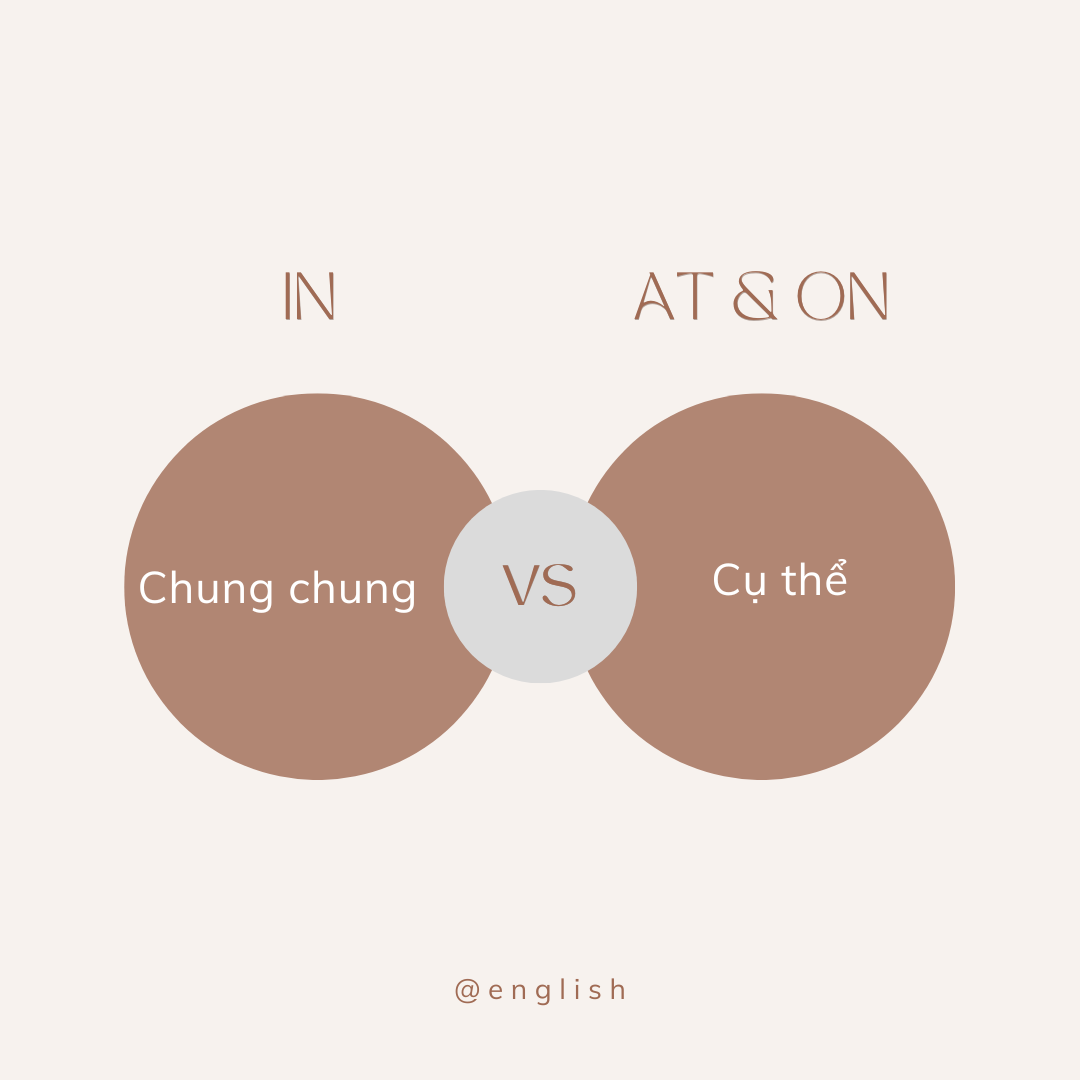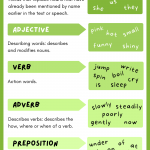
Sử dụng IN ON AT
Từ cụ thể đến chung chung nhất
AT >>> ON >>> IN
| IN được dùng để chỉ thời gian, địa điểm phạm vi rộng, khái quát, chung chung. | AT và ON được dùng với những mốc thời gian và địa điểm cụ thể. |
Phân biệt IN, ON, AT
| IN | Khi muốn nhắc tới một khoảng thời gian chung chung, lâu dài, ví dụ như tuần, tháng, năm, thế kỷ, thập kỷ,… hoặc một địa điểm rộng lớn như một quốc gia, một vùng,… | – in 1998 – in the 20st century – in May – in Vietnam – in the neighborhood |
| ON | Khi muốn nói đến những mốc thời gian cụ thể hơn, ngắn hơn, và địa điểm, không gian có độ lớn tương đối | – on the street – on the beach – on Monday – on the weekend – on July 25th |
| AT | Giới từ at là giới từ có tính cụ thể nhất chỉ thời gian và địa điểm. Chúng ta dùng giới từ at để nói tới một mốc thời gian hoặc địa điểm cực kỳ cụ thể. | – at the mall – at home – at number 56 on the street – at 7 o’clock – at the moment |

IN ON AT với thời gian
| IN | In được dùng để chỉ một khoảng thời gian dài trong tương lai hoặc thời gian để làm xong một việc gì đó. | – He finished the test in 45 minutes. (Anh ấy kết thúc bài test trong 45 phút) – The EDM festival will be held in 3 days. (Lễ hội EDM sẽ được tổ chức trong 3 ngày tới) |
| In được dùng để ám chỉ một khoảng thời gian dài: tuần, tháng, năm, mùa, thế kỷ, thập kỷ,… | – I was born in 1996 (Tôi sinh năm 1996) – It’s hot in the summer (Thời tiết rất nóng vào mùa hè) | |
| ON | On được dùng để chỉ các ngày cụ thể trong tuần, trong tháng, trong năm. | – I’m going to the party on March 31st. (Tôi sẽ đi dự một bữa tiệc vào ngày 31.3) – Do you go to school on Saturday? (Bạn có phải đi học vào thứ 7 không?) |
| AT | At được dùng để chỉ mốc thời gian có tính cụ thể | – I will be there at 10 AM. (Tôi sẽ có mặt ở đó lúc 10h sáng) – My sister is sitting in the class at the moment. (Em gái tôi giờ đang ngồi trong lớp học) |
| At được dùng để chỉ thời điểm có tính ngắn hạn | – There’s a great TV program at midnight (Có một chương trình TV rất hay lúc nửa đêm) – We woke at dawn (Chúng tôi dậy lúc tờ mờ sáng) | |
| At được dùng để nói về những kỳ nghỉ, dịp lễ | – We usually eat turkey on Thanksgiving. (Chúng tôi thường ăn gà tây vào dịp lễ Tạ Ơn) – I will meet my relatives and friends at New Year. (Tôi sẽ gặp họ hàng và bạn bè vào dịp năm mới) |
- In dùng để chỉ các thời gian chính trong ngày (in the morning, in the afternoon,…), trong khi at được dùng để chỉ những thời gian phụ chỉ kéo dài vài tiếng, xen kẽ giữa những thời gian chính (at noon, at night…).
- Khi nói về các kỳ nghỉ, at và in được dùng để chỉ cả dịp nghỉ lễ kéo dài (at Christmas Day, in Tet Holiday,…), trong khi on được dùng để chỉ ngày chính của dịp lễ (on Christmas day – đêm Giáng sinh, on New Year’s Eve – đêm giao thừa,..).
- Với từ chỉ cuối tuần, có thể dùng cả 3 giới từ in, on, at. Tuy nhiên nếu dùng at thì không có “the” (at weekend, on the weekend, in the weekend).

IN ON AT với nơi chốn, địa điểm
| IN | In được dùng để chỉ một địa điểm lớn | – There are 195 countries today in the world. (Trên thế giới có tất cả 195 quốc gia) – Spring rolls is one of the most popular dishes in Vietnam. (Nem rán là một trong những món ăn phổ biến nhất ở Việt Nam) |
| In được dùng để chỉ một không gian | – I found a puppies in a small box. (Tôi tìm thấy một chú cún con trong một chiếc hộp nhỏ) – You can find everything in the market. (Bạn có thể tìm thấy bất cứ thứ gì trong chợ) | |
| In được dùng để chỉ phương hướng | – I live in the North of Vietnam (Tôi sống ở phía Bắc của Việt Nam) | |
| In được dùng để chỉ vị trí của ai đó mà không có mạo từ đi kèm | – She is in office now. (Hiện giờ cô ấy đang ở văn phòng) | |
| ON | On được dùng để chỉ những địa điểm trên bề mặt | – I put my wallet on the table. (Tôi để ví của tôi lên mặt bàn) – The boat is floating on the sea. (Con thuyền đang trôi trên mặt biển) |
| On được dùng để chỉ một địa điểm cụ thể | – She lives on Tran Phu street. (Cô ấy sống trên phố Trần Phú) – He’s working on the 15th floor. (Anh ấy đang làm việc trên tầng 15) | |
| On được dùng với một số cụm từ chỉ vị trí | – The bookshelf is on the left of the room. (Kệ sách nằm ở phía bên trái căn phòng) – Please write your name and your personal information on the back of the sheet after finishing. (Xin hãy viết tên và thông tin cá nhân của bạn ở mặt sau tờ giấy sau khi hoàn thành) | |
| AT | At được dùng để chỉ định vị một địa điểm một cách cụ thể, chính xác | – The government recommend staying at home (Chính phủ khuyến cáo ở yên trong nhà) – She lives at 131 Tran Phu street. (Cô ấy sống ở số nhà 131 phố Trần Phú) |
| At được dùng để chỉ một không gian nếu người nói coi không gian đó như một điểm | We will meet each other at the club. (Chúng ta sẽ gặp nhau ở câu lạc bộ nhé) | |
| At được dùng để chỉ một địa điểm khi người nói muốn đề cập tới sự kiện, hoạt động diễn ra ở địa điểm đó. | – There will be an interesting workshop at the cafe. (Sẽ có một buổi workshop rất thú vị diễn ra tại quán cà phê đó) |
Khi in, on, at, được dùng để chỉ cùng 1 địa điểm, in sẽ chỉ ý nghĩa “bên trong sự vật”, on là “trên bề mặt sự vật” và at mang nghĩa thông báo ai đó đang ở địa điểm đó.
Ví dụ: in the sea (trong lòng biển), on the sea (trên mặt biển), at sea (trên bãi biển)
Theo Engbreaking
Bài tập
Giới từ chỉ thời gian (Prepositions of Time)
1. Lucy is arriving ____ February the 13th ____ 8 o’clock ____ the morning.
2. The weather is often terrible in London _____ January.
3. It’s better to get a taxi if you are out alone _____ night.
4. She got married _____ September.
5. They usually go to the south of France _____ the summer.
6. Columbus sailed to the Americas _____ the 16th century.
7. The Beatles were popular _____ the 1960s.
8. I graduated from university _____ 2001.
9. His birthday is _____ June.
10. I usually go to my parents’ house _____ Christmas. We eat turkey together _____ Christmas Day.
11. The train leaves _____ tomorrow morning ______ 8:00 AM.
12. I love going skiing ______ January.
13. We met at the restaurant ______ 8 pm.
14. The class is ____ 9am ______ Monday mornings.
15. I like to drink coffee ______ the morning and tea ______ the afternoon.
16. We went out for dinner _____ last Wednesday.
17. She left London _____ the 4th of March.
18. I had a party _____ my birthday.
19. Lucy went to New York ______ New Year.
20. We’re meeting _____ lunchtime _____ next Tuesday.
Đáp án
1. Lucy is arriving on February the 13th at 8 o’clock in the morning.
2.The weather is often terrible in London in January.
3. It’s better to get a taxi if you are out alone at night.
4. She got married in September.
5. They usually go to the south of France in the summer.
6. Columbus sailed to the Americas in the 16th century.
7. The Beatles were popular in the 1960s.
8. I graduated from university in 2001.
9. His birthday is in June.
10. I usually go to my parents’ house at Christmas. We eat turkey together on Christmas Day.
11. The train leaves tomorrow morning at 8:00 AM.
12. I love going skiing in January.
13. We met at the restaurant at 8 pm.
14. The class is at 9am on Monday mornings.
15. I like to drink coffee in the morning and tea in the afternoon.
16. We went out for dinner _ last Wednesday.
17. She left London on the 4th of March.
18. I had a party on my birthday.
19. Lucy went to New York at New Year.
20. We’re meeting at lunchtime _ next Tuesday.
2. Giới từ chỉ nơi chốn (Prepositions of Place)
1. The wine is ______ the bottle.
2. Pass me the dictionary, it’s ______ the bookshelf.
3. Jennifer is ______ work.
4. Berlin is ______ Germany.
5. You have something ______ your face.
6. Turn left ______ the traffic lights.
7. She was listening to classical music ______ the radio.
8. He has a house ______ the river.
9. The answer is ______ the bottom of the page.
10. Julie will be ______ the plane now.
11. There are a lot of magnets ______ the fridge.
12. She lives ______ London.
13. John is ______ a taxi. He’s coming.
14. I’ll meet you ______ the airport.
15. She stood ______ the window and looked out.
16. The cat is ______ the house somewhere.
17. Why are you calling so late? I’m already ______ bed.
18. I waited for Lucy ______ the station.
19. There was a picture of flowers ______ her T-shirt.
20. She has a house ______ Japan.
Đáp án
1. The wine is in the bottle.
2. Pass me the dictionary, it’s on the bookshelf.
3. Jennifer is at work.
4. Berlin is in Germany.
5. You have something on your face.
6. Turn left at the traffic lights.
7. She was listening to classical music on the radio.
8. He has a house on the river.
9. The answer is at the bottom of the page.
10. Julie will be on the plane now.
11. There are a lot of magnets on the fridge.
12. She lives in London.
13. John is in a taxi. He’s coming.
14. I’ll meet you at the airport.
15. She stood at the window and looked out.
16. The cat is in the house somewhere.
17. Why you calling so late? I’m already in bed.
18. I waited for Lucy at the station.
19. There was a picture of flowers on her T-shirt.
20. She has a house in Japan.
3. Giới từ đứng sau động từ (Prepositions after Verbs)
1. It’s so noisy – I can’t concentrate _____ my homework.
2. Don’t worry – I’ll pay _____ the tickets.
3. The car belongs _____ my father, so I don’t think we can use it.
4. I borrowed a pen _____ my classmate.
5. I’ve been waiting _____ the bus for more than twenty minutes!
6. Julie: “What time shall we eat dinner?”
Gill: “It depends _____ John – we’ll eat when he gets home”.
7. When we arrived _____ the cinema, the film had already started.
8. Please explain this problem _____ us.
9. She was listening _____ the radio when the doorbell rang.
10. John worries _____ his exam results all the time.
Đáp án
1. on
2. for
3. to
4. from
5. for
6. on
7. at
8. to
9. to
10. about
4. Giới từ đứng sau tính từ (Prepositions after Adjectives)
1. England is famous ________ its rainy weather.
2. I’m very proud ________ my daughter, she worked very hard.
3. He isn’t really interested ________ getting married.
4. Luke is very pleased ________ his exam results.
5. Unfortunately, I’m very bad ________ music.
6. I’ve been married ________ my husband for 10 years.
7. She’s very excited ________ the party.
8. Julie is very different ________ her sister.
9. My niece is afraid ________ dogs.
10. A ball gown is similar ________ an evening dress.
Đáp án
1. England is famous for its rainy weather.
2. I’m very proud of my daughter, she worked very hard.
3. He isn’t really interested in getting married.
4. Luke is very pleased with his exam results.
5. Unfortunately, I’m very bad at music.
6. I’ve been married to my husband for 10 years.
7. She’s very excited about the party.
8. Julie is very different from her sister.
9. My niece is afraid of dogs.
10. A ball gown is similar to an evening dress.
5. Giới từ trong thành ngữ (Preposition Collocations)
1. She paid for lunch ___________ advance, so we don’t need to pay now.
2. I went to the wrong house ___________ mistake!
3. Please make sure that you’re ___________ time for the class!
4. I was walking to the station and ___________ chance I saw the glove I’d lost on the ground.
5. I love eating out in London. ___________ instance, one of my favourite restaurants has amazing Japanese food.
6. I think the cat is ___________ danger on that high roof.
7. I picked up the laptop and ___________ my surprise it fell apart in my hands.
8. I have a lot ___________ common with my cousin. We both like many of the same things.
9. If the baby starts to cry, pick her up ___________ once.
10. Did you forget your purse ___________ purpose so you wouldn’t have to pay?
Đáp án
1. She paid for lunch in advance, so we don’t need to pay now.
2. I went to the wrong house by mistake!
3. Please make sure that you’re on time for the class!
4. I was walking to the station and by chance I saw the glove I’d lost on the ground.
5. I love eating out in London. For instance, one of my favourite restaurants has amazing Japanese food.
6. I think the cat is in danger on that high roof.
7. I picked up the laptop and to my surprise it fell apart in my hands.
8. I have a lot in common with my cousin. We both like many of the same things.
9. If the baby starts to cry, pick her up at once.
10. Did you forget your purse on purpose so you wouldn’t have to pay?



